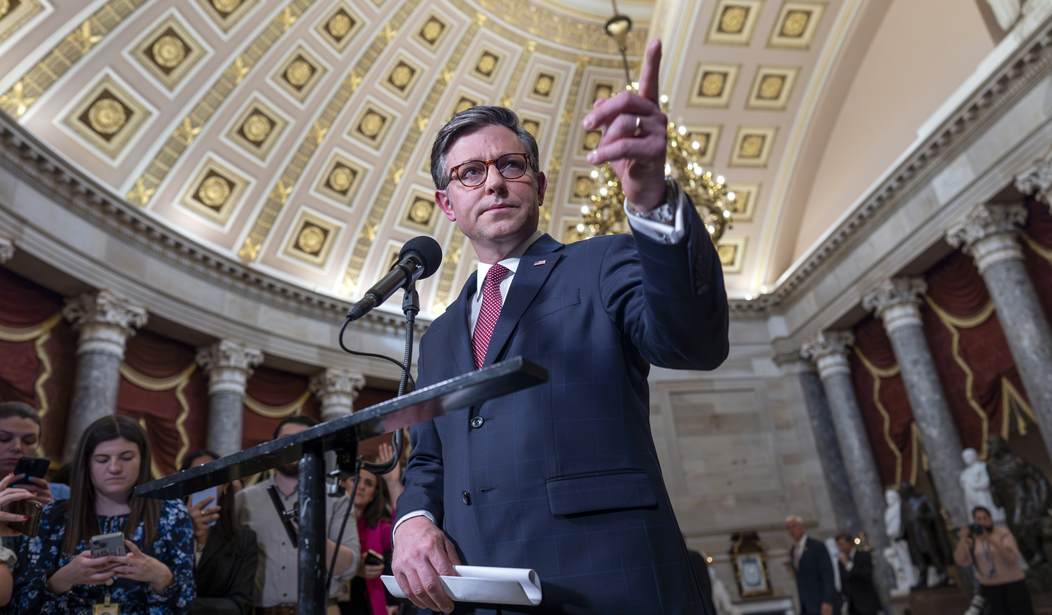UPDATE: 2:38 p.m.: Rep. Ralph Norman (R-S.C.) and Rep. Keith Self (R-Texas) switched their votes to Johnson on the first vote, giving him the majority and the House Speaker's gavel.
Original article: Rep. Mike Johnson (R-La.) has failed to win the votes necessary to win the House Speakership in the first round of voting.
The final tally of the first round:
- Mike Johnson: 216 votes.
- Hakeem Jeffries: 215 votes
- Others: 3 votes.
A 218-vote majority was needed to win the speakership.
Although Johnson successfully steered the government away from a shutdown before Christmas, his negotiations over the continuing resolution sparked criticism within the GOP. Some members expressed their desire to replace him with new leadership over serious reservations about his ability to lead effectively. With the party holding only a razor-thin majority, Johnson was only able to afford to lose just one Republican vote — assuming full attendance.
Rep. Thomas Massie (R-Ky.) previously indicated he would not vote for Johnson, but Donald Trump, who expressed support for Johnson last week, has taken an active role in rallying support from other holdouts and undecideds, urging potential holdouts to back Johnson.
However, Rep. Ralph Norman (R-S.C.) voted for Rep. Jim Jordan (R-Ohio) for speaker, and Rep. Keith Self (R-Texas) voted for Rep. Byron Donalds (R-Fla.).
“This is a stunningly stupid and suicidal strategy," former House Speaker Newt Gingrich told Fox News about the Republican holdouts. "And they're going to look like idiots.”
Trump’s strategy was straightforward: avoid a chaotic speakership battle that could derail his agenda from the outset. The drawn-out fight to elect Johnson in the first place served as a stark reminder of how damaging internal GOP conflicts can be. By endorsing Johnson, Trump sought to put these divisions to rest, recognizing that a fractured Republican Party at the start of his second term would hand a significant advantage to the Democrats.
Rep. Marjorie Taylor-Greene (R-Ga.) had previously criticized Johnson but came around, understanding the need for Republican unity to support the Trump agenda.
For our VIPs: Hey, GOP: Mike Johnson Is Not the Enemy!
According to ABC News, Johnson chose not to cut any backroom deals to secure votes. He has emphasized his commitment to improving the institution without resorting to the concessions that characterized Kevin McCarthy’s tumultuous tenure.
“My simple message to my colleagues is [to] make suggestions about process and improvements. We are open to that at all times. But I don’t make deals with anyone," he said. "There’s no quid pro quo here. I don’t do anything in exchange for a vote other than commit to make this institution work as effectively and efficiently as possible."
“In the previous Congress, McCarthy was forced to meet Republican hardliner demands to be elected speaker after a four-day voting process,” ABC News reported. “One of those demands — a lower threshold to bring a motion to vacate — led to his downfall just seven months later when he was forced out of leadership by a small group of GOP members.”
Unfortunately, Trump’s endorsement of Johnson sadly wasn’t enough to swiftly resolve the GOP infighting, leaving the future of the MAGA agenda in jeopardy. A united Republican Party is critical to advancing Trump’s ambitious vision for the country. Without unity, Republicans risk failure, and any hard-won gains from 2024 could be squandered if they cannot deliver meaningful results for the American people.
The key problem going forward is that there is no heir apparent to Johnson. Speculation about potential replacements, including Reps. Jim Jordan (R-Ohio), Tom Emmer (R-Minn.), and Byron Donalds (R-Fla.) has intensified the past couple of weeks, but none of those candidates are likely to get universal support from House Republicans.
It’s disappointing that Republicans can’t resolve their internal issues behind closed doors, instead dragging the country through a prolonged battle over the speakership. When Trump takes office on January 20 — assuming a speaker is elected by then — the last thing the GOP needs are distractions or continued division. If Republicans fail to come together, it will be nearly impossible to push Trump’s agenda through Congress.
“President Trump was given a MANDATE by the American people to fix our country - that hard work can’t begin until we come together as a conference and get to work,” Rep. Ronny Jackson (R-Texas) said in a post on X Thursday evening.
Without a speaker, the House is effectively paralyzed. It cannot conduct routine business, including the swearing-in of members. More significantly, a delay in electing a speaker could disrupt the constitutional process of certifying Trump’s anticipated victory in the 2024 presidential election. The final certification is slated for January 6, with Kamala Harris presiding over the certification. If a speaker is not elected before January 20, the president pro tempore of the Senate — in this case, Sen. Chuck Grassley (R-Iowa) — would effectively become acting president until the speaker vote is resolved.
Such a scenario is unprecedented in American history.










Join the conversation as a VIP Member